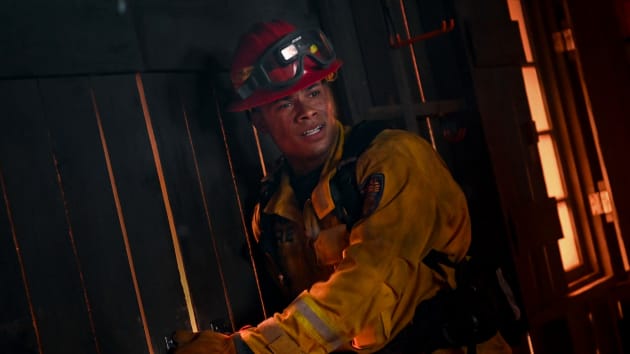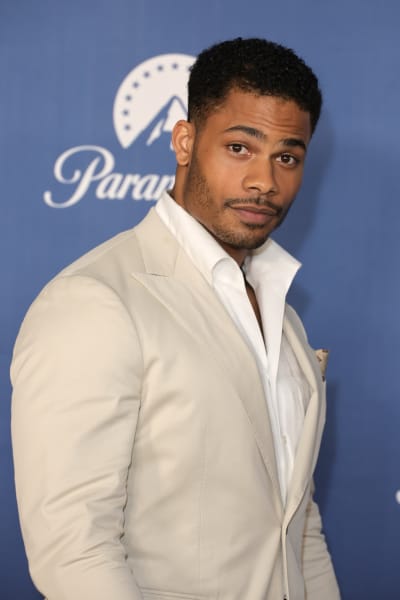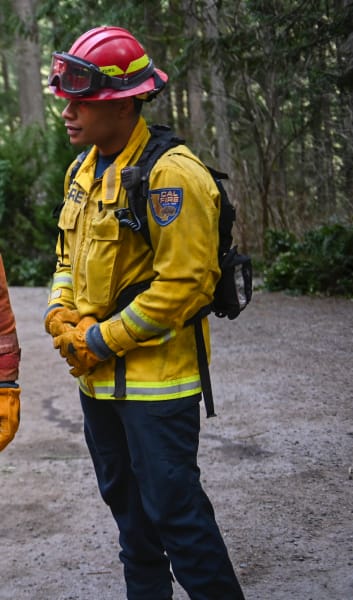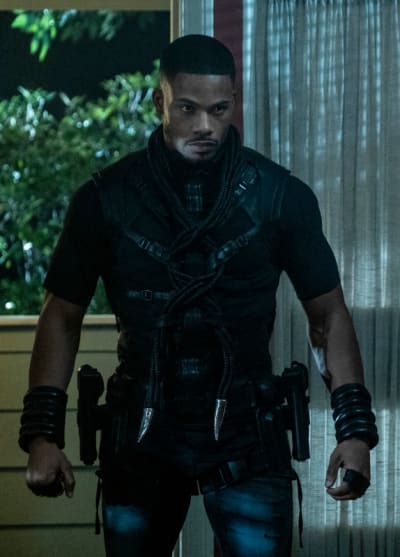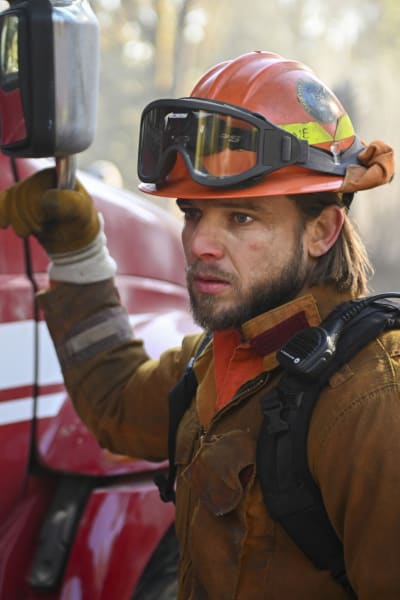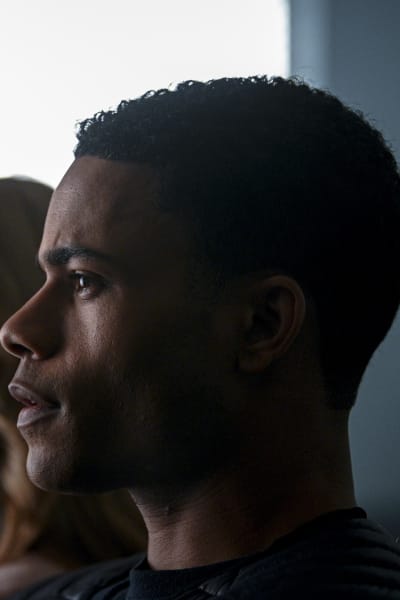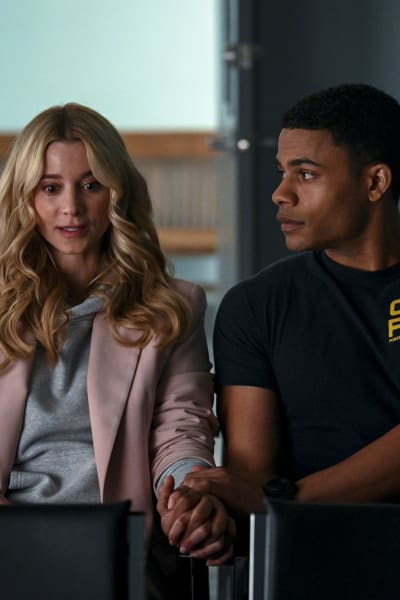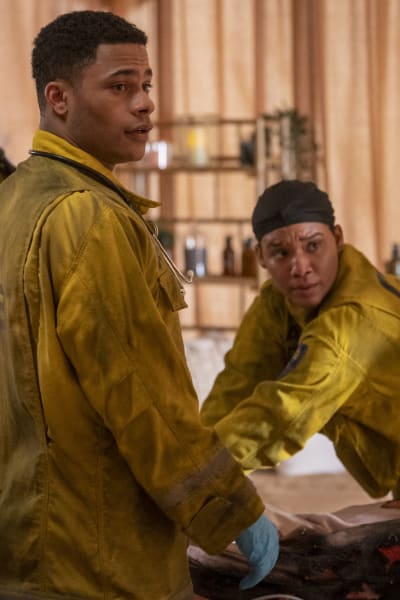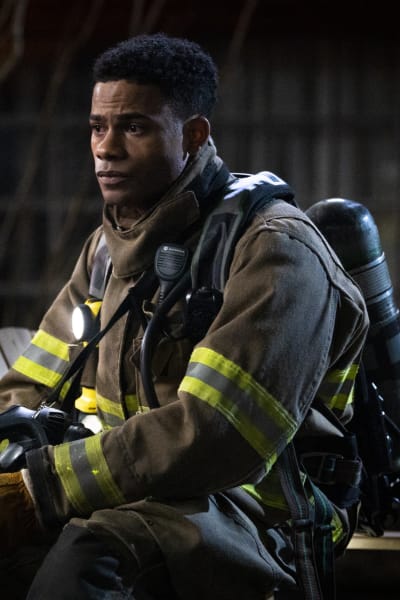As Fire Country‘s second season continues to heat up, the show’s central characters are being put through the wringer like never before.
And that means, of course, that the series’ stars are facing new challenges in terms of heart-rending drama and pulse-pounding action sequences, some of which are unlike anything that’s ever been attempted on network television.
We recently had the opportunity to sit down with Jordan Calloway, who plays firefighter Jake Crawford, for a conversation about his character, his career, and what the future holds for Fire Country.
Jordan, of course, is no newcomer to the world of television.
He got his start on the Nickelodeon sitcom Unfabulous way back in 2004, and his role on Black Lightning made him an important figure in the CW’s Arrowverse.
But Jordan has reached a new pinnacle thanks to his work on one of TV’s most-watched show, and he had some very interesting things to say about Fire Country’s unique premise and the show’s ability to spark difficult conversations. Take a look:
You have a long history in the world of television and you’ve portrayed some very memorable characters over the years. What drew you to Fire Country and Jake Crawford, and how is this job different from what you’ve done in the past?
I would definitely say the first thing is that I’m playing somebody closer to my age, so that’s great. I love CW. They love to have older people playing younger, so that’s nice being able to play in my age range.
I think also surprising enough, while Black Lightning was physically demanding, you’d be surprised, but Fire Country is more demanding.
Also with us being wildland firefighters as well, we do a lot of exterior shoots. So we’ll be out in the good old tundra of Canada and it is cold, it is very cold. But hey, it’s Fire Country in snow, rain, sleet, whatever you want.
You went from Black Lightning to Fire Country, two very different shows in a lot of ways, but in what ways are they similar? How is a superhero drama like a firefighting drama?
Funny enough, both shows touched with family drama and looking at the theme of family and what that all entails. One was based in the urban cities of Freeland, whereas this one is based in the back roads and towns of Edgewater.
So you have a difference in the arena, which is really cool, one being the urban sort of metro type of arena that you would have whereas this Edgewater is more of a small town, more country feel, Northern California, small hometown-type vibes.
So you’re going to get two different types of characters that come out of that, given their different life circumstances as well, which is what we’re also learning.
With Fire Country you’re seeing a story from Jake’s perspective told linear, but you’re seeing how the effects of the past have affected him in his modern-day life whereas with Black Lightning, we had more of a linear storytelling for Khalil where we saw what he was experiencing and going through, from the gunshot in the back and then we saw how that life went forward.
So I think given the two vehicle types, one being more of an ensemble cast but still focused on Bode Leone, as well as the entire 42 Firehouse and Three Rock, you don’t really have that much time on network TV to be able to go and show what Jake is always going through.
So you’ll see how different an event in somebody’s life is maybe affecting three other different characters in Edgewater, which makes sense because it’s a small town.
Fire Country is a show that asks viewers to root for a convicted criminal. Some of them have committed violent crimes.
As a first responder who works closely with convicts, your character is sort of caught between these two worlds and he has a very complex relationship with Bode as an actor. Is it ever difficult to pull off that balancing act?
I think the complexity between Bode and Jake doesn’t have anything to do with Three Rock and 42 or the fact that they’re convicted felons.
In our research and in our constant interviews that we’ve had or the seminars that we’ve taken, the relationship between the firefighters and the convicts actually are among the best.
Sure, you may have some bad apples in the fire department and in the Three Rock, as is the case everywhere.
But I think what we focus on in Fire Country is the story of redemption, the story of showcasing these convicted felons as not convicted felons and not just as firefighters, but as men, as women, as humans, people that as we see firsthand from Bode’s perspective, an individual that is on a road for redemption, an individual that is struggling at redemption at the same time.
It’s not going to be an easy cakewalk, but then, looking at the community around them and how they feed into that as well in this redemptive journey, if that makes sense.
One thing that sets the show apart, is the very powerful narrative about redemption at its heart. How does it feel to know you’re delivering that important message week after week, viewers reached out to you?
That’s probably one of the best questions ever asked because it is the best feeling.
I loved doing Black Lightning, and I loved playing Painkiller, had the most fun, would love to do it again.
But seeing that I’m playing a character that is one of an actual superhero, where my niece and nephews will be like, “Oh, you’re a firefighter, yeah,” but then also seeing it in the sense knowing that my show is also tied to a bigger show of, “Hey, we’re not a show. We’re a show about showing people second chances.”
My grandfather, he said to me, “Never let your past paralyze your future.” So that, I think, goes hand-in-hand with Fire Country.
Fire Country holds a special place in my heart, knowing that we are telling stories of individuals that are working towards a second chance, those that have been deemed the worst or given up on by society, and yet we’re showing a show where it’s like, “Hey, you’re more than your worst day.”
The nuanced, sensitive portrayal is so important. It’s so big in terms of changing the conversation in this country.
You said it. And to be a part of a show, to do that, to help try and change a narrative or change what’s commonly being talked about and putting it in a positive light and speaking positively.
In my writing class when I was in college, my screenwriting class, we learned about Aristotelian drama:
The point of it is to cause a catharsis within the audience, to cause them to ask questions in order to better the city-state, or the polis, at the time. That’s Aristotelian thinking.
So hearing you say that and having this dialogue — it’s not just the responsibility of Fire Country; it’s the responsibility of drama all around, any form of art, whether it’s music, art or cinema.
We’re called to take a responsibility to cause the audience to ask questions in order to better themselves, not just for themselves, but for the community as a whole.
You could read a million newspaper articles about these inmates fighting fires, but to see it portrayed the way you do it, is so much more power, that speaks to people on a different level.
It’s kind of two shows in one. I was wondering what scenes challenge you more as an actor: the ones involving the interpersonal drama or the more action-oriented sequences?
I’m always here for a good challenge. I love a good challenge. I love the action. I’m a physical person, so I wouldn’t necessarily say that’s the challenge.
I would say maybe yeah, doing drama, I would say finding the drama for certain times, I guess, yeah. You know what? Looking at the drama on network TV, it can be hard.
It can be very difficult because we are confined to a certain slotted amount of time, and whether it’s the edits or whether it’s the directing, trying to find a way to still have the pacing within a scene that’s dramatic, as well as the breaths that need to be in there for a dramatic scene and then to see them get cut or chopped or it gets fed up, it’s understandable why, but that’s also the challenge because how do you still convey truth in artistic form, but also meet the bottom line?
So I would say that’s probably the challenge, which it’s whatever, it comes with it, but yeah. You compare Fire Country to any streaming show, they get more time because they don’t have to have the commercials in there.
Lastly, I won’t ask you for any spoilers, but can you tell us anything about what’s in store for the remainder of this season?
Man, heartbreak. How about those good old bars, jail, blood, and what else?
Oh, we wouldn’t be Fire Country if we didn’t have something that was going to cause some more drama and possibly break Jake’s heart, so there’s some of that.
Tyler Johnson is an Associate Editor for TV Fanatic and the other Mediavine O&O sites. In his spare time, he enjoys reading, cooking, and, of course, watching TV. You can Follow him on X and email him here at TV Fanatic.
Read the original article here



